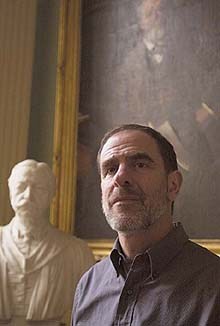The newly merged offices of dean of Harvard College and dean of undergraduate education have been entrusted to Benedict H. Gross '71, Ph.D. '78, Leverett professor of mathematics. The appointment, announced in early April by William C. Kirby, dean of the Faculty of Arts and Sciences (FAS), follows Kirby's March 17 decision to combine the functions in an enlarged office of the dean of Harvard Collegeand to do so in hands other than those of the incumbent dean of the College, Harry R. Lewis '68, Ph.D. '74 (see "Deconstructing the College Deanship," May-June, page 48). Lewis, who is McKay professor of computer science, planned to return to teaching following the conclusion of his University Hall service on June 30. Gross first took up FAS administrative duties last September, when Kirby named him dean of undergraduate education. In that role, he has been directing the faculty's comprehensive review of the College course of studies (see "Curriculum Czar," November-December 2002, page 54).
 |
| Benedict Gross |
| Photograph by Kris Snibbe / Harvard News Office |
Acknowledging that his newly consolidated decanal duties had come as a surprise, Gross nonetheless maintained in an interview in late April that the "division of these two offices is artificial." Combining the academic aspects of students' experience with their residential and extracurricular livesthe purview of the Harvard College dean heretoforeought to make it easier to assure that, for example, "undergraduate advising is coordinated with undergraduate teaching." In this light, Gross forecast, the structure of the new deanship, which he and Kirby will determine this summer after an advisory committee reports to them, should make it easier to accomplish changes called for by the curriculum review.
To realize that potential is no mean feat. "I've been struck by how much goes on in the College office," said Gross, reeling off facts about the Harvard Student Agencies budget ($8 million), participation in Phillips Brooks House Association (30 percent of students perform public service each year), and the sheer "vastness" of athletic and artistic programs. Gross acknowledged Lewis's detailed command of all these activities, most of them not known in any depth by faculty members. Simultaneously, surveying the total of nearly two dozen direct reporting relationships he and Lewis maintained as separate deans, and the "uncountable" faculty committees on which they served (strong language from a mathematician), Gross suggested that a simplified management structure and wide delegation would be necessary so a faculty successor could assume the unified office five years hence. "It's doable and it's sensible," he said of the consolidation. "In some bizarre way, I'm looking forward to it."
The payoff, as he sees it, is in "treating what Harry [Lewis] calls the 'whole student.' I don't want the students to divide their lives into what they study and what they do." Among the opportunities he identified are exploring ways that "extracurricular activities in the arts and public service can be integrated into the curriculum" as the academic program is being rethought. He also cited the stubborn divide between House-based senior tutors, who report through the College, and departmental head tutors, who report through the dean of undergraduate education; they rarely talk to each other about the advising they offer undergraduates. Similarly, implementing liberalized study-abroad rules raises complex issues of concentration, advising, and residential placement. "There are a lot of silos out there," said Gross of the management challenge he hopes to overcome.
Of student and alumni concerns that the curriculum review and decanal reorganization represent an "attack on extracurriculars, a 'secret plan' to get students to study 40 hours a day," Gross responded in two ways. In a humorous vein, he said, "As if deans could influence the time students devote to extracurriculars. And anyway, those activities have bigger budgets than I do." More seriously, he said, extracurricular involvements are central to "all the skills we don't teach in the classroom"teamwork, how to make short presentations, how to get along with other people who have different perspectives. "Those skills are just as valuable as the knowledge we teach them in the classroom." In this, Gross spoke from experience: as Kirby carefully noted when introducing the dean-designate to the faculty, Gross as an undergraduate played viola for the Harvard-Radcliffe Orchestra and Gilbert and Sullivan Players productions.
Gross did acknowledge a sense on campus that students' academic experience might not measure up to the rich extracurricular environment in the College. "That is the reason Bill [Kirby] organized the review," he said, expounding with passion on the unfolding curriculum overhaul. He called the present curriculum "baroque," with faculty members uncertain about its requirements and students resorting to complex maneuvers to navigate their way through. "I'd much rather the students in the class and the teachers teaching it are there because they want to be," Gross said. A simpler, more flexible program would help students "be excited about their studies, to cite them up front along with extracurriculars" as the highlights of Harvard. That would excite professors, too, he said, and would help "turn the faculty inward, toward the College," as they also pursue research, administer academic centers, and train graduate students.
Influencing the behavior of students and faculty colleagues at large, becoming acquainted with the House masters, assuming leadership of the Administrative Board, beginning implementation of the new policies on sexual assault (see page 68) and related issues of alcohol abuse, and dozens of other matters large and small are now all on Gross's agenda. For the foreseeable future, he won't have much time for the viola or his tennis partnersincluding President Lawrence H. Summers, who began challenging Gross to sets shortly after returning to Cambridge in 2001. But the president has made the undergraduate curriculum review a high priority (see page 63), so the two will no doubt have plenty of other occasions to interact in the months ahead.








